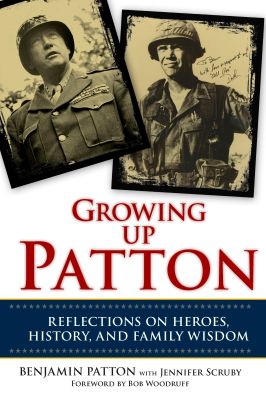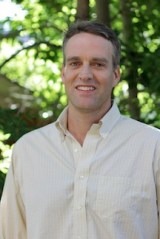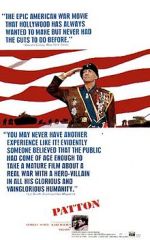 Just how heavy a rucksack is carrying the name Patton around on your back? Benjamin Patton, grandson of World War II’s legendary General George Patton, has sat himself down and written a book on the very topic.
Just how heavy a rucksack is carrying the name Patton around on your back? Benjamin Patton, grandson of World War II’s legendary General George Patton, has sat himself down and written a book on the very topic.
Growing Up Patton: Reflections on Heroes, History, and Family Wisdom distills Ben Patton’s views on the general, much of it gleaned from the correspondence between the general and Ben’s father while a cadet at the U.S. Military Academy at West Point. Battleland conducted an email chat with Patton last week:
How often are you asked if you are related to the general?
I’m asked this question all the time. It happens less often as the WWII generation fades away, though the figure of General Patton has remained in the public consciousness even though the feature film Patton was made over 40 years ago.
How do you respond?
When I was much younger, I was rather ambivalent about my grandfather and, frankly, annoyed at being judged in comparison to him so often. But my parents always reminded my siblings and me that any special attention we received through being in the Patton family was unearned. Furthermore, it was our responsibility to be available to those people – such as veterans or citizens of the countries my grandfather helped liberate – for whom a mere handshake with us provided a powerful connection to the man they so revered.
Is having that last name a burden or a blessing?
At times it’s been a difficult burden to shoulder – particularly at those points in my adult life when I was unclear about my professional path. At those junctures in my life, my grandfather’s and father’s chosen vocation – the road decidedly not taken by me – seemed so clear and attractive.
But as I’ve come to peace with these two overwhelming figures and discovered my own authentic path in life, it has been a very positive experience. I can draw on their experiences and earned wisdom and apply those lessons in my career, albeit in a different context.
My father certainly felt it, too. In comparison, I’d say he had it much tougher. Just six months after his father’s untimely death in December of 1945, my dad graduated from West Point with the same name in the same branch of service. At graduation, someone approached him saying, “You’ll never be the man your father was, but congratulations anyway.” Imagine having to listen to that on the first day of your professional career.
Why did you write Growing Up Patton?
Like anyone who loses a beloved parent, there were many conversations I simply never had with my old man: questions I was too proud or too self-involved to ask when I had the chance. This book offered me another opportunity to learn about my father and know him by re-connecting with a dozen people who knew and/or worked with my father at critical times in his and their lives.
It’s a fascinatingly diverse bunch. They include: Manfred Rommel, son of Patton’s WWII rival Field Marshall Erwin Rommel, and one of my father’s close friends; Sammy Choi, a Korean kid who my father hired to do odd jobs while he was in the Korean War – Choi later emigrated to the US, joined the Army and came to work for my father as an enlisted aide; Lady Abbess Benedict Duss, who had been a young American nun at a French monastery near Paris, liberated by the Third Army.
My older sister, who is now a Benedictine nun at the Connecticut abbey founded by Duss, once told me that some relationships can only go so far in life, but can progress in death. Hopefully that’s true of mine with my father – I miss him a lot.

Berkley
Describe the relationship between George Patton, your grandfather, and George Patton, your father?
Good question. For most of my father’s childhood, he and his dad spent a lot of time together – sailing, riding, shooting, and visiting more than a few battlefields. My father was literally immersed in military life – and he loved every minute of it.
But in the late nineteen thirties, at the age of 13, my dad was sent to a boarding school to get a more stable education (military families typically move every 1-2 years often disrupting the academic year). When my father had just entered West Point, his dad visited him briefly at school and then left for North Africa to fight the Germans.
Despite both being incredibly busy for the next several years (my father as a struggling cadet and my grandfather leading huge armies in combat across Africa and Europe) they remained in contact through weekly correspondence. Most of this correspondence was unpublished until the release of this book. The dialogue between them is fascinating – a mix of father-son advice and tactical talk.
How do you see your grandfather’s legacy?
Well, of course General Patton is perhaps best known for excellence in mobile warfare – using tanks like cavalry to exploit a dynamic situation. One of his favorite quotes was said by Danton during the French Revolution – “De l’audace, encore de l’audace, toujours de l’audace!” “Audacity, audacity, always audacity.”
He was constantly counseled by his superiors to take care of his flanks – to which he responded (to his staff): “My flanks are something for the enemy to worry about, not me. Before he finds out where my flanks are, I’ll be cutting the bastard’s throat.”
Much lesser known was his deep concern for the soldier. The infamous slapping incidents of July 1943, which nearly ended his career, have often obscured this redeeming quality of his leadership. Trademark discipline and the ever-greater demands on his combat troops always went hand in hand with making sure they were properly outfitted, and had at least one hot meal a day whenever feasible.
I saw this quality of top-down loyalty and concern in my father’s career as well. Both of them used what my dad termed “visible personality” to inspire their troops whenever possible – and I have no doubt that this quality ultimately inspired their soldiers to fight harder and faster, to win more quickly – and ultimately reduce casualties.
I draw on these lessons every day in my own work, helping veterans suffering from Post-Traumatic Stress by helping them to produce short films about things they and their families are struggling with.
Did you serve in the military?
I was never drawn to the Army, but for most of my childhood, I had dreams of becoming a naval aviator. Although I was accepted to the Naval Academy Prep School, I ultimately decided not to pursue a military career – at 17, I simply wasn’t mature or directed enough to want to make a then-ten year commitment.
Admittedly, it took me a while to find my way vocationally, and I was delighted to discover an aptitude for film and music production. Today, in addition do doing documentary work and producing personal video biographies for families interested in preserving their family history, I also co-founded the I WAS THERE films initiative with my Denver-based partner and fellow producer/educator Scott Kinnamon. We have begun working with soldiers being treated for Post-Traumatic Stress at Army Warrior Transition Units, helping them reclaim their narrative through short film production in an engaging and healing way. More information can be found at www.iwastherefilms.org.
What is your opinion on the wisdom of the wars in Afghanistan and Iraq, and how they have been waged?
It is folly to opine too deeply when I have infinitely less information, intelligence or first-hand knowledge of these complex conflicts. With the benefit of hindsight, however, I do question the wisdom of any long-term military incursion in which our allies – not to mention the Iraqis and Afghans themselves – are fractured and largely unsupportive of our incredibly costly efforts on their behalf.
But while we are finally bringing these conflicts to a close, my focus is on the American soldiers and their families. I’m particularly concerned about the many thousands of Reservists and National Guard troops who, after multiple combat deployments, return to civilian communities without the infrastructure and built-in family support system found on a military base.
What did you think of the movie?
It’s a great movie! The movie Patton came out when I was five, and I can’t count how many times I’ve watched it. Look, I’m a Patton – and perhaps know a lot more about my grandfather than most people. But like so many people who have experienced him largely through the film, I am also a fan.
And for all my grandfather’s shortcomings (oh yes, he did have them), my father deeply admired his dad. Once, when we were watching some old home movies of my grandfather sailing the Pacific in the 1930s, my dad forgot himself for a moment and whispered: “He was something else. That guy was something else.”
In the end, my most important link to my grandfather was through my dad – he taught so much of what he learned from his dad to my siblings and I. For all that he accomplished, to some extent, in spite of his legacy – he is the titan in my eyes.


